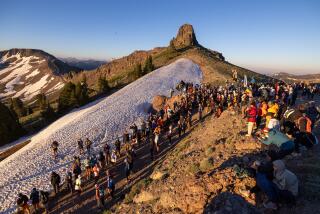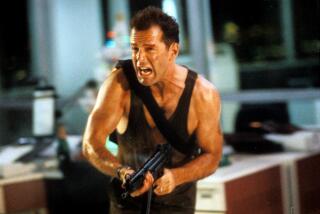ONE STEP BEYOND : Not Satisfied With Conventional Endurance Events, Thousand Oaks’ Willis Undertakes Triple Triathlon
When Scott Willis took up running three years ago, his first race was 10 miles. Two weeks later, he ran a marathon.
Last year, when Willis decided to compete in his first triathlon, he signed up for the Alabama Double Iron Triathlon in Huntsville. The Alabama Double, the most grueling in the country, is twice as tough as the well-known Ironman Triathlon in Hawaii.
If there had been a more challenging triathlon, Willis said he would have tried it. So no one was surprised when Willis competed in the World Endurance Challenge--a triple triathlon--this past May in Grenoble, France.
The Endurance Challenge is the world’s toughest triathlon. Participants had 60 hours in which to swim 7.2 miles, bicycle 336 miles, and finish with a 78.6-mile run. Willis placed 13th out of 29 competitors with a time of 52 hours 28 minutes 26 seconds, tops among the six U.S. entrants. He stopped only three times for sleep, taking an hour each time.
Willis, a 28-year-old aerospace engineer from Thousands Oaks, said that although his personality is a bit on the conservative side, when it comes to athletics he knows no boundaries. He has run nine marathons as well as several 50- and 100-mile challenges.
The Endurance Challenge, however, has been his biggest undertaking.
“A lot of people wonder why I would want to do something like a triple triathlon,” the 6-foot-1, 180-pound Willis said. “There really isn’t a simple explanation. It’s just that old thing of really liking a challenge. I like to see how far I can push my body both physically and mentally. It’s not that I think I’m better than other people, but the longer the race the more challenging it is for me.”
Much of Willis’ motivation is instilled by his longtime friend and roommate, Jack Nosco. Nosco got Willis interested in running, and the two have competed in many races together, including the Endurance Challenge.
“Jack and I are always looking for outrageous things to do,” Willis said. “We saw an ad for the triple triathlon in a magazine a few years ago and said maybe we would try it one day. One day was finally here and we decided to go for it. I had some reservations at first because of how difficult the double triathlon was. Going from 30 hours of competition to 50 or 60 hours of competition is a much, much greater challenge.”
Willis began training for the event last January. Each week he would swim five miles, bicycle 150 miles and run 40 miles. One Saturday, he rode his bike to Palm Springs and back. Although he has never failed to finish a race, Willis’ biggest concern with the Endurance Challenge was whether he would complete it.
“I didn’t want to go all the way over to France and not finish,” he said. “That would have been very embarrassing. But when you’re talking about such long distances, there’s always the element of unknown. I certainly had a few doubts.”
Willis and Nosco brought their girlfriends to France to be in their support crews. Willis was able to get his company to sponsor him and cover most of his expenses. The trip cost about $3,000.
The Endurance Challenge, the first of its kind, was started in 1986 by the city of Grenoble, nestled at the base of the French Alps in southwestern France. It has been held every other year since its inception, but it will be an annual event beginning next year. The race has drawn about 30 competitors each time; no women participated this year. Wolfgang Erhart of Austria won in 37:28:40.
Willis arrived in Grenoble several days before the race, which began at 8 a.m. on Thursday, May 24. Beginning with the swimming portion, he churned back and forth in a 50-meter pool for just under four hours, stopping three times to eat.
The temperature dropped to about 60 degrees and it started to rain by the time Willis began the cycling portion at noon. He had to complete seven 44-mile loops, which circled the town and neighboring countryside, often going over steep mountainside roads.
Vickie Andrews, Willis’ girlfriend, was one of four support crew members who followed him in a van during this portion. She made sure he had dry clothes and prepared his meals. She also offered emotional support. The van kept its lights on Willis so he could see at night.
Willis completed five loops before he took his first break to sleep at 8 Friday morning. A gymnasium in town had been set up with cots for those who wanted to rest. Willis was back on his bike by 9, but shortly after he started the sixth lap he stopped and contemplated dropping out of the race.
“It was raining very hard and the winds were so strong that I could barely get my bicycle going,” he said. “I bet I wasn’t going more than five miles per hour. I couldn’t take it anymore, so I just pulled over and had a good cry. I’ve done this before in 100-mile runs, so I know when I get it all out of my system I’ll be ready to start up again. I was just very tired at this point and not thinking straight.”
Andrews offered support. “I’ve seen him like this before, so I know what he’s going through. I just put my arm around him and told him he didn’t come all the way over here to stop now. Scott is not a quitter, and there was never any doubt in my mind that he would finish.”
Willis regrouped and finished the final two laps by 3 that afternoon. He then slept before starting the running portion. The run was broken down into 20 laps of approximately four miles each. Willis said he felt great on the first six laps but was feeling pain before he took his final sleep break at 6 Saturday morning.
Andrews ran with Willis for the final 44 miles, trying to keep him awake and alert. She was with him when he crossed the finish line at noon Saturday. A throng of television and newspaper reporters surrounded him at the finish line.
“My first goal was just to finish,” Willis said. “My second goal was to get a good time. Survival is always more important to me than winning. I wanted to complete the race in 54 hours, so I was very happy with my time. I was even more happy to be the first American finisher. I was very proud of what I did. It wasn’t easy.”
Nosco placed 16th overall, second among U.S. entrants with a time of 53:32.00. Eleven competitors did not finish.
Willis went straight to his hotel after the race and slept for three hours. He said he felt fatigued for the next month and has not competed since.
“I’m glad I did it, and I was glad to finish, but I’m not sure if I’d do it again,” Willis said.


